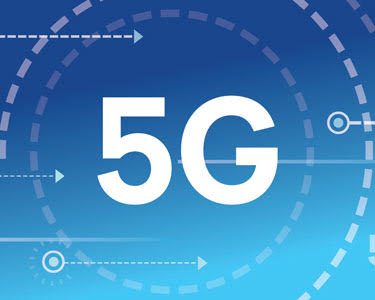The internet is a defining element of the twenty-first century as it forever changed the way we live, communicate, and get information. This is particularly true for wireless technology. Today, more than 99 percent of Americans have access to an LTE network, and they’re using it to do everything from binge-watching their favorite TV shows to “hailing” a car from a ride-sharing service. Mobile networks and the services that depend on them have also given rise to the digital economy, which supports millions of jobs, billions of dollars in annual economic activity, and massive opportunity.
A new chapter in America’s wireless story is about to begin, and it’s poised to have an even more significant impact than before. It comes at a critical time as increasing dependence on wireless services combined with a “go mobile” trend that crosses many industries is fueling a surge in demand for data and putting pressure on wireless networks. Cisco reports that mobile data traffic in the U.S. grew 44 percent last year and projects it will increase five-fold by 2021. Wireless networks must be strengthened to support this growth. Attention, as a result, is shifting to a new era of innovation. This is 5G.
The mentality powering the advent of 5G is nothing new. We’re always striving to be better, faster, and stronger. The ancient Greeks invented the crane to build taller buildings. The Romans created aqueducts to bring fresh drinking water to their rapidly growing towns. And in comparatively modern times, Benjamin Franklin’s experiments with electricity sparked activity that eventually led to Thomas Edison’s lightbulb.
5G, also known as the fifth-generation or next-generation of wireless, will run on high-band spectrum that was once considered worthless. But thanks to innovative thinking, it is now in-demand. In addition to having the capacity to handle unprecedented amounts of data, 5G is expected to have near real-time speeds that are 100 times faster than 4G and ultra-low latency.
This sounds great, but why is it significant? No one is going to object to faster movie downloads. The implications here are much compelling.
Consider healthcare. According to Mary Meeker’s annual internet trends report, healthcare is at a “digital inflection point.” Consumers are increasingly relying on connected technology to monitor their health and communicate with doctors and other healthcare professionals. This trend is increasing access to and improving care. For example, Meeker’s report shows that because of the rise in inputs and data, medical knowledge is doubling every three and a half years; that’s an improvement over every seven years as of 1980 and every 50 years as of 1950.
Further, neurosurgeons are using virtual reality to practice remote interventional brain procedures, and research suggests it’s making surgeries safer. This is just the beginning. For health-IT to grow and become commonplace, it’s imperative that the network supporting it is reliable. Disruptions or lag time would be prohibitive.
The benefits of 5G will reach far beyond healthcare. Cities are about to get “a radical makeover” that’ll “redefin[e] the business of running a city.” As a result, city operations will significantly improve, with innovations like autonomous cars and metro lines, sensor-monitored trash bins, smarter street lights, and energy-efficient buildings. Neighborhoods and their surrounding communities will also grow safer, with advanced connectivity that will not only make it possible for law enforcement to track crimes in real-time but also position them to respond faster. In short, every sector stands to be improved.
The economic impact is also remarkable. For cities, a report by Cisco estimates the number is $2.3 trillion globally through 2024. Meanwhile, a report from Accenture estimates the U.S. will reap $275 billion in investments, 3 million new jobs, and $500 billion in GDP.
Finally, 5G will help level the playing field for opportunity and innovation. As the Accenture report rightfully points out, more robust networks will allow consumers to take advantage of video-centric applications for learning and working that’ll make them more attractive to employers and create a more competitive workforce. As this happens, the digital economy will grow and so will appetite for innovation and investment in communities of all sizes. Who knows where the next Silicon Valley will be? AOL co-founder Steve Case is certainly making a case for a fly-over country.
For all these reasons and more, there is much to be excited about 5G. But before we try to skip a few pages ahead to the 5G chapter in America’s wireless story, we shouldn’t breeze over how 5G comes to fruition. Pro-innovation agendas are critical to moving society forward. As is often the case with today’s challenges, success will depend on a “can do” mentality consisting of lawmakers, industry, and tech leaders working together to craft the right policies, regulations, investments and practices. And there are promising signs so far.
The Federal Communications Commission (FCC) is considering proposals to reduce regulatory barriers that impact network deployment and is moving on critical components of Chairman Ajit Pai’s “Digital Empowerment Agenda,” that aims to empower more Americans digitally by expanding broadband access. In addition, a bipartisan resolution from U.S. Senators Roger Wicker (R-MS) and Brian Schatz (D-HI) was introduced this summer to show support for 5G, while U.S. Senators Cory Gardner (R-CO) and Maggie Hassan (D-NH) introduced legislation to free up spectrum, a limited resource that’s the invisible infrastructure of wireless networks.
States including Arizona, Colorado, and Indiana have also positioned themselves to lead on 5G deployment, streamlining permitting processes and expediting local network buildouts. These are all good indicators that next generation broadband is well on its way. And once here, life will never be the same.

